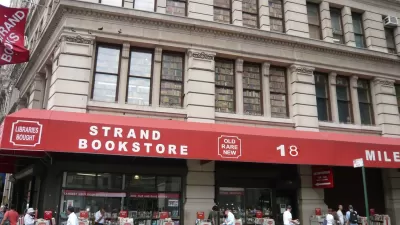Ben Adler writes about the growing contingent of policy wonks, architects, and architectural critics who believe that preservationists have acquired too much power.
Once the underdogs in the David vs Goliath battle between greedy developers and concerned communities trying to protect their historic heritage, critics blame landmarking for making the most desirable cities unaffordable for the middle class, writes Adler.
Critics trace preservation's failings to two factors, "Critics in the first category are not opposed to landmarking, but worry that architecturally undistinguished buildings and neighborhoods are winning landmark status for political or sentimental reasons. The result, they say, is a public that embraces architectural nostalgia rather than innovation. At the same time, some economists and policy experts maintain that cities are limiting their economic potential by constraining the supply of new housing and commercial development through too much landmarking."
Preservation has also suffered by being co-opted as a common tool for powerless communities to prevent unwanted development. As a result, preservation has become a victim of its own success. As more and more places find value in the unique character that historic buildings can provide, that value often translates to economic pressures (redevelopment pressures, higher home prices) that mixed-income communities across the country struggle to address.
FULL STORY: Is landmarking a shield or a sword in the fight against overdevelopment?

Maui's Vacation Rental Debate Turns Ugly
Verbal attacks, misinformation campaigns and fistfights plague a high-stakes debate to convert thousands of vacation rentals into long-term housing.

Planetizen Federal Action Tracker
A weekly monitor of how Trump’s orders and actions are impacting planners and planning in America.

San Francisco Suspends Traffic Calming Amidst Record Deaths
Citing “a challenging fiscal landscape,” the city will cease the program on the heels of 42 traffic deaths, including 24 pedestrians.

Defunct Pittsburgh Power Plant to Become Residential Tower
A decommissioned steam heat plant will be redeveloped into almost 100 affordable housing units.

Trump Prompts Restructuring of Transportation Research Board in “Unprecedented Overreach”
The TRB has eliminated more than half of its committees including those focused on climate, equity, and cities.

Amtrak Rolls Out New Orleans to Alabama “Mardi Gras” Train
The new service will operate morning and evening departures between Mobile and New Orleans.
Urban Design for Planners 1: Software Tools
This six-course series explores essential urban design concepts using open source software and equips planners with the tools they need to participate fully in the urban design process.
Planning for Universal Design
Learn the tools for implementing Universal Design in planning regulations.
Heyer Gruel & Associates PA
JM Goldson LLC
Custer County Colorado
City of Camden Redevelopment Agency
City of Astoria
Transportation Research & Education Center (TREC) at Portland State University
Jefferson Parish Government
Camden Redevelopment Agency
City of Claremont





























